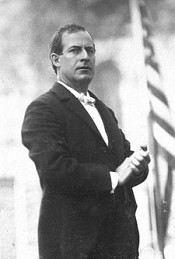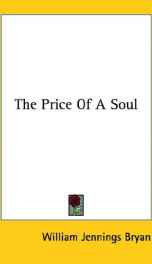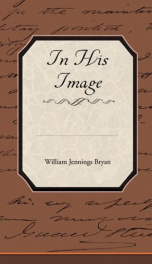Bryan William Jennings

William Jennings Bryan (March 19, 1860 – July 26, 1925) was the Democratic Party nominee for President of the United States in 1896, 1900 and 1908, a lawyer, and the 41st United States Secretary of State under President Woodrow Wilson. One of the most popular speakers in American history, he was noted for a deep, commanding voice. Bryan was a devout Presbyterian, a supporter of popular democracy, a critic of banks and railroads, a leader of the silverite movement in the 1890s, a leading figure in the Democratic Party, a peace advocate, a prohibitionist, an opponent of Darwinism, and one of the most prominent leaders of populism in the late 19th - and early 20th century. Because of his faith in the goodness and rightness of the common people, he was called "The Great Commoner." In the intensely fought 1896 and 1900 elections, he was defeated by William McKinley but retained control of the Democratic Party. For presidential candidates, Bryan invented the national stumping tour. In his three presidential bids, he promoted Free Silver in 1896, anti-imperialism in 1900, and trust-busting in 1908, calling on Democrats, in cases where corporations are protected, to abandon states' rights, to fight the trusts and big banks, and embrace populist ideas. President Woodrow Wilson appointed him Secretary of State in 1913, but Wilson's handling of the Lusitania crisis in 1915 caused Bryan to resign in protest. He was a strong supporter of Prohibition in the 1920s, and energetically attacked Darwinism and evolution, most famously at the Scopes Trial in 1925. Five days after winning the case but getting bad press, he died in his sleep.[1] The son of Silas and Mariah Elizabeth Bryan, Bryan was born in the Little Egypt region of southern Illinois on March 19, 1860. Bryan's mother was born of English heritage.[2] Mary Bryan joined the Salem Baptists in 1872, so Bryan attended Methodist services on Sunday morning, and in the afternoon, Baptist services. At this point, William began spending his Sunday afternoons at the Cumberland Presbyterian Church. At age 14 in 1874, Bryan attended a revival, was baptized, and joined the Cumberland Presbyterian Church. In later life, Bryan said the day of his baptism was the most important day in his life, but, at the time it caused little change in his daily routine. He left the Cumberland Presbyterian Church and joined the larger Presbyterian Church in the United States of America. His father Silas was born of Scots-Irish and English stock in St.Croix.[3] As a Jacksonian Democrat, Silas won election as a Democrat to the Illinois State Senate. The year of Bryan's birth, his father lost his seat, but shortly won election as a state circuit judge. The family moved to a 520-acre (210.4 ha) farm north of Salem in 1866, living in a ten-room house that was the envy of Marion County. Until age ten, Bryan was home-schooled, finding in the Bible and McGuffey Readers support for his views that gambling and liquor were evil and sinful. To attend Whipple Academy, which was attached to Illinois College, 14-year-old Bryan was sent to Jacksonville in 1874. Following high school, he entered Illinois College and studied classics, graduating as valedictorian in 1881. During his time at Illinois College, Bryan was a member of the Sigma Pi literary society, and later initiated the Nebraska Chapter of the Acacia Fraternity.[4] To study law at Union Law College (which later became Northwestern University School of Law), he moved to Chicago. While preparing for the bar exam, he taught high school. While teaching, he eventually married pupil Mary Elizabeth Baird in 1884. They settled in Salem, Illinois, a town with a population of two thousand. Mary became a lawyer and collaborated with him on all his speeches and writings. He practiced law in Jacksonville (1883–87), then moved to the boom city of Lincoln, Nebraska. In the Democratic landslide of 1890, Bryan was elected to Congress and reelected by 140 votes in 1892. He ran for the Senate in 1894, but was overwhelmed in the Republican landslide. In Bryan's first years in Lincoln, he traveled to Valentine, Nebraska on business where he met an aspiring young cattleman named James Dahlman. Over the next forty years they remained friends, with Dahlman carrying Nebraska for Bryan twice while he was state Democratic Party chairman. Even when Dahlman became closely associated with Omaha's vice elements, including the breweries, as the city's eight-term mayor, he and Bryan maintained a collegial relationship.[5] In 1893, the repeal of the Sherman Silver Purchase Act resulted in the collapse of the silver market. Bryan stumped the country for free silver in 1894-96, building a grass roots reputation as a powerful champion of the cause. At the 1896 Democratic National Convention, Bryan lambasted Eastern monied classes for supporting the gold standard at the expense of the average worker. His "Cross of Gold" speech made him a sensational new face in the Democratic party. The Bourbon Democrats who supported incumbent conservative President Grover Cleveland were defeated and the party's agrarian and silver factions voted for Bryan, giving him the nomination of the Democratic Party. At the age of 36, Bryan remains the youngest presidential nominee of a major party in American history. Disappointed with the direction of their party, Gold Democrats invited Cleveland to run as a third-party candidate, but he declined this offer. Cleveland did, however, support John M. Palmer, nominee of the Gold Democrats, rather than Bryan.[6] In addition, Bryan formally received the nominations of the Populist Party and the Silver Republican Party. Without crossing party lines, voters from any party could vote for him.[7] In 1896 the Populists rejected Bryan's Democratic running mate Maine banker Arthur Sewall and named as his running mate Georgia Representative Thomas E. Watson. People could vote for Bryan and Sewell or for Bryan and Watson. The Republicans nominated William McKinley on a platform calling for prosperity for everyone through industrial growth, high tariffs and sound money (gold). Republicans ridiculed Bryan as a Populist. However, "Bryan's reform program was so similar to that of the Populists that he has often been mistaken for a Populist, but he remained a staunch Democrat throughout the Populist period."[8] This is because, despite having used many of the Populist ideas, Bryan kept all of his Democratic views while simply adding the Populist views to gain their votes. Bryan demanded Bimetallism and "Free Silver" at a ratio of 16:1. Most leading Democratic newspapers rejected his candidacy. However, despite this rejection by the newspapers, Bryan won the Democratic vote. Republicans discovered in August that Bryan was solidly ahead in the South and West, but far behind in the Northeast. He appeared to be ahead in the Midwest, so the Republicans concentrated their efforts there. They said Bryan was a madman—a religious fanatic surrounded by anarchists—who would wreck the economy.[9] By late September, the Republicans felt they were ahead in the decisive Midwest and began emphasizing that McKinley would bring prosperity to all Americans. McKinley scored solid gains among the middle classes, factory and railroad workers, prosperous farmers and among the German Americans who rejected free silver. Bryan gave 500 speeches in 27 states. McKinley won by a margin of 271 to 176 in the electoral college. Bryan volunteered for combat in the Spanish-American War in 1898, arguing, "Universal peace cannot come until justice is enthroned throughout the world. Until the right has triumphed in every land and love reigns in every heart, government must, as a last resort, appeal to force." Bryan became colonel of a Nebraska militia regiment; he spent the war in Florida and never saw combat. After the war, Bryan opposed the annexation of the Philippines (though he did support the Treaty of Paris that ended the war). Bryan gave a speech at the Democratic National Convention in 1900 called "The Paralyzing Influence of Imperialism." In this speech he discusses his views against the annexation of the Philippines, asking what gives the United States the right to overpower people of another country just for a military base. He mentions, at the beginning of the speech, that the United States should not try to be like the Imperialistic British and other European countries. He ran as an anti-imperialist, finding himself in alliance with Andrew Carnegie and other millionaires. Republicans mocked Bryan as indecisive, or a coward, a point spoofed by the Bryan-like Cowardly Lion in The Wonderful Wizard of Oz, published in spring 1900.[10] Bryan combined anti-imperialism with free silver, saying: The nation is of age and it can do what it pleases; it can spurn the traditions of the past; it can repudiate the principles upon which the nation rests; it can employ force instead of reason; it can substitute might for right; it can conquer weaker people; it can exploit their lands, appropriate their property and kill their people; but it cannot repeal the moral law or escape the punishment decreed for the violation of human rights.[11] In a typical day he gave four hourlong speeches and shorter talks that added up to six hours of speaking. At an average rate of 175 words a minute, he turned out 63,000 words, enough to fill 52 columns of a newspaper. In Wisconsin, he once made 12 speeches in 15 hours.[12] Before Bryan held any political office there remained a need for income; public speaking would not become any less of a passion as it also became a source of income for Bryan and his family. Bryan held an estate in Nebraska as well as a 240-acre (0.97 km2) ranch in Texas, of which both were paid for with earnings from publications of The Commoner as well as speaking fees. Bryan's rates were noted as $500.00 per speech in addition to a percentage of the ticket sales profit. He held his base in the South, but lost part of the West as McKinley retained the Northeast and Midwest and rolled up a landslide. McKinley won the electoral college with a count of 292 votes compared to Bryan's 155. This means that Bryan actually lost more states than he had in 1896.
do you like this author?
What readers are saying
What do you think? Write your own comment on this book!
write a commentWhat readers are saying
What do you think? Write your own comment on this author!
write a commentBook list

The Price of a Soul
Series:
Unknown
Year:
Unknown
Raiting:
3/5
"The Price of a Soul" is an address delivered by Mr. Bryan, first at the Northwestern Law School Banquet in Chicago, then as a Commencement Oration at the Peirce School in Philadelphia and, in 1909, extended into a lecture. --This text refers to the Kindle Edition edition.
Show more
add to favoritesadd In favorites

In His Image
Series:
Unknown
Year:
Unknown
Raiting:
2.5/5
Today, William Jennings Bryan is remembered as a Populist orator and perennial Presidential candidate, or as Clarence Darrow's unsuccessful antagonist in the 1925 Scopes "Monkey Trial." However, he was also a committed Christian, and this book gives a statement of his criticisms of evolution, and his own defense of Christianity. It is finally becoming well-known that Bryan was not really "forced to admit" the antiquity of the Earth under Darrow's rough cross-examination; in fact, he conceded this point in the trial itself.
Show more
add to favoritesadd In favorites
Book list

The Price of a Soul
Series:
Unknown
Year:
Unknown
Raiting:
3/5
"The Price of a Soul" is an address delivered by Mr. Bryan, first at the Northwestern Law School Banquet in Chicago, then as a Commencement Oration at the Peirce School in Philadelphia and, in 1909, extended into a lecture. --This text refers to the Kindle Edition edition.
Show more
add to favoritesadd In favorites

In His Image
Series:
Unknown
Year:
Unknown
Raiting:
2.5/5
Today, William Jennings Bryan is remembered as a Populist orator and perennial Presidential candidate, or as Clarence Darrow's unsuccessful antagonist in the 1925 Scopes "Monkey Trial." However, he was also a committed Christian, and this book gives a statement of his criticisms of evolution, and his own defense of Christianity. It is finally becoming well-known that Bryan was not really "forced to admit" the antiquity of the Earth under Darrow's rough cross-examination; in fact, he conceded this point in the trial itself.
Show more
add to favoritesadd In favorites
What readers are saying
What do you think? Write your own comment on this author!
write a commentif you like Bryan William Jennings try:
readers also enjoyed
What readers are saying
What do you think? Write your own comment on this author!
write a commentif you like Bryan William Jennings try:
readers also enjoyed
Do you want to read a book that interests you? It’s EASY!
Create an account and send a request for reading to other users on the Webpage of the book!

